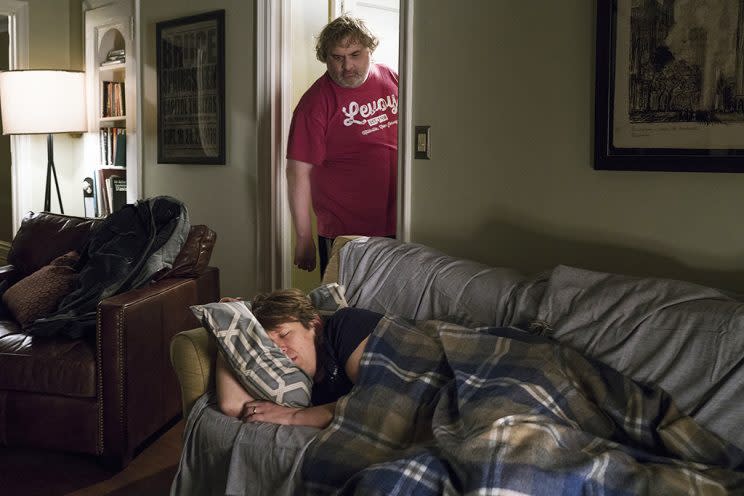Pete Holmes Talks Fictionalizing His Stand-Up Story in HBO’s ‘Crashing’

Honesty may be a lonely word, but it’s also an essential ingredient of Pete Holmes’s brand of comedy. The 37-year-old comic has a history of using his stand-up sets, as well as his popular podcast, You Made It Weird, to tackle deeply personal subjects. Now he’s bringing that honesty to HBO in the form of Crashing, a semi-autobiographical series created and starring Holmes and produced by Judd Apatow. While set in the present day, the show is predicated on a story from the creator’s past when his marriage fell apart at the same time he was struggling to launch his comedy career.
Kicked out of his house, Holmes’s TV counterpart (also called Pete Holmes) couch-surfs in the living rooms of such established comics as Artie Lange and Sarah Silverman, who also play themselves. Holmes tells Yahoo TV that liberties have definitely been taken in translating his real life into fiction, but revisiting that part of his history has offered a fair amount of catharsis. “Re-living the heartbreak was difficult; you’d be shooting it and thinking, ‘This is really heavy.’ But then editing it, you make it funny, too. So it’s fun in that regard, and also healing.” Holmes also revealed what it was like to purposely bomb in front of a live audience and why he hopes that his short-lived late-night talk show, The Pete Holmes Show, attains Ben Stiller Show-like cult status.
When I spoke with Judd Apatow about Crashing, he suggested this is a very personal story for you. How did you go about transforming it into the events we watch on the show?
The story is really, really personal. It’s been fictionalized, certainly, and changed. If you just tell things exactly how they happened, first of all, legally, that’s a nightmare. Second of all, it’s not as interesting as you might think it is. You need a master like Judd to elegantly, efficiently, and hilariously bring it out. Judd very naturally thinks in stories. One of the first things he did was to tell me, “Just write 10 pages on everything you remember about that time.” So I e-mailed him a document that was filled with truly embarrassing admissions and sad things. I have no problem delving into the tragic to find really, really funny things, and he and I have that in common. My parents still have no idea how this is a comedy! [Laughs.]
You have to tell them, “No, this is funny — trust me.”
Yeah, I know. I think when it’s not your son [it’s funnier]. My dad thought the show was going to be like The Odd Couple, with crazy hijinks happening and a different roommate each week. I suppose he’s not entirely wrong. There are hijinks and it is certainly very funny. The pilot kind of does the heavy lifting in terms of getting most, though not all, of the tragedy [out of the way] and then it gets rolling and gets really funny.
Did you always intend to play a version of yourself on the show?
The initial conceit of the show was to have everybody playing themselves. That was very important to me. I wanted to create this world where the only person that regressed was me. I’m playing the 2007 version of myself, but everybody else is the 2016 version of themselves. Which is funny because someone like T.J. Miller, who appears in the second and third episodes, is a real person and a real friend. When I actually got divorced in real life, we went to Pittsburgh and spent a week there, just cheering me up and having fun. The difference between T.J. in real life and T.J. in the show is that when I was with him in 2007, he wasn’t famous yet. But on Crashing, he’s playing the post-Deadpool T.J. whereas I’m [pre-fame] Pete. So it’s a little confusing, but once people get into the show, I don’t think they’re going to be saying, “I don’t get it — where’s his podcast?”
Was it strange to put yourself back in the place of being a comedian who isn’t established as you are now?
Oh, yeah. I was joking with Judd that the scenes [in the pilot] where I had to perform at an open-mic and bomb was the most painful part. [Laughs.] There’s 300 people there, and they’re extras. Your body still kind of goes into that fight or flight response, and you get that back sweat. And even though you know it’s the story that you’re not supposed to be good yet, it still bothers you a little bit. Still, I think the whole process was a little bit therapeutic. I wish everybody could have an opportunity — maybe they could on a smaller scale — to recreate some of the trauma from their lives like the pain of starting out in stand-up and going to a club where they don’t know you and don’t even want you. [Reliving that moment] I was like, “I don’t know how I did it.” If I was 37 and starting as an open mic-er it would be a real challenge.
I’m curious — how did you ensure that you’d bomb onstage? Did you deliberately write bad material? Or was the audience of extras instructed not to laugh?
One, stand-up is so hard. Even if you are trying, you probably won’t do that great. We treated our background actors well, but there’s still a cattle call element. There’s 300 of them, so some production assistant with a headset is going to, at some point, bark at them to stay in line or be quiet or whatever. It kind of feels like a schoolroom in that way, so it’s not a great [environment]. Also, the alchemy of stand-up is so specific. The darkness and coldness [of the club], and also the alcohol can help. That’s when people want to unwind. But if you’re performing at 2 p.m. in a hot room and there’s a group of actors there who aren’t your friends and aren’t on dates, they just want to make a fast buck and they saw this ad on Craigslist, it’s hard to turn that into a good show. I didn’t have to work very hard to bomb! [Laughs.]

Judd also taught me something he learned while making Funny People, which is that if you want the audience to stop laughing, just keep telling the same joke over and over without warning them. That way, you’ll get the comedian acting believably, but the audience will make certain sounds and groan and it’s not fake because they’re actually feeling it. What was more remarkable was that Artie Lange and T.J. had great sets [in the same setting]! I was in the easier position where I was supposed to do badly, so the pressure was off. It still sucked, though. I wanted a stiff drink afterwards.
Related: Judd Apatow Talks Final Season of ‘Girls,’ His Next HBO Series, ‘Crashing,’ and the Return of ‘Love’
You mentioned your podcast earlier, and that medium has been one way that contemporary comedians are connecting with their fans. We seem to go through cycles where stand-up comedy becomes intensely interesting to people. Is podcasting the key to the current fascination with stand-up?
In the past, “comedian” was a very convenient job for the lead in a sitcom to have, because it explained very quickly why he was funny, and why he probably had an OK amount of money. You didn’t wonder why he was able to go on vacation or eat in a nice restaurant. When Jerry took that girl up to Vermont on Seinfeld, nobody thought, “Why does this guy have all this time off?” Our show is a little bit different in that we want to talk about what it’s like to start out as a stand-up, to see the comedian’s origin story. Judd and I were really excited by that.
More to your question, I think, if you look at someone who I admire very much like Louis C.K., being a comedian is the perfect excuse to be very honest. And that’s been encouraged by the rise of podcasts. We now know what it’s like to upload a comedian into your brain through hundreds of podcasts. I barely know Marc Maron, but I feel like I know him so well from listening to WTF. With the advent of podcasts, we’ve gotten a taste for blood — you know what I mean? The premium is higher than it’s ever been for humor that’s authentic and transparent. And with our show, we’re bleeding on the page in some ways. We’re telling secrets. It’s comedy soaked in something relatable and true, and I would argue even a little bit mythic.
Prior to landing at HBO, you hosted The Pete Holmes Show in the post-Conan spot on TBS. Looking back on that series now, how do you feel about your experience in late-night TV?
I’m actually wearing Pete Holmes Show pajamas right now! [Laughs.] I wish I had taken more pairs of them — these are getting kind of dingy. I’m the type of comedian that will blame the audience. I’m not saying I blame the audience of The Pete Holmes Show, but I’m very quick to say it was an algorithm — it was a ratings thing and it was the structure of TBS at the time. I know TBS has changed since then, and I’ve had a couple of people [casually] tell me that our show would have done better in the climate they’ve created now.
But I wouldn’t have changed a thing; I’m so proud of it, and I think we did something special given the parameters and the budget and everything. We were shooting nine episodes a week, often months in advance. I’d come out and say, “Hey, it’s Christmastime,” and it was August! I’ve said before that we did exactly the number of episodes we could’ve done before we would’ve started eating ourselves. I really want Netflix or somebody to put it out — we had to take it off YouTube for some legal reason. I’m holding out for the Ben Stiller Show later-appreciation thing. We’ll see if it happens!
Crashing premieres Feb. 19 at 10:30 p.m. on HBO.
Read More:
‘This is Us’ Recap: What Would Jack Do?
‘Doubt’ EPs Preview New Drama Starring Katherine Heigl and Laverne Cox
‘Sun Records’ Exclusive: Chad Michael Murray on Playing ‘Big Personality’ Sam Phillips


